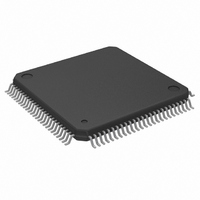HD64F7047F50V Renesas Electronics America, HD64F7047F50V Datasheet - Page 108

HD64F7047F50V
Manufacturer Part Number
HD64F7047F50V
Description
IC H8 MCU FLASH 256K 100TQFP
Manufacturer
Renesas Electronics America
Series
SuperH® SH7047r
Specifications of HD64F7047F50V
Core Processor
SH-2
Core Size
32-Bit
Speed
50MHz
Connectivity
CAN, SCI
Peripherals
POR, PWM, WDT
Number Of I /o
53
Program Memory Size
256KB (256K x 8)
Program Memory Type
FLASH
Ram Size
12K x 8
Voltage - Supply (vcc/vdd)
4.5 V ~ 5.5 V
Data Converters
A/D 16x10b
Oscillator Type
Internal
Operating Temperature
-20°C ~ 75°C
Package / Case
100-TQFP, 100-VQFP
Package
100PQFP
Family Name
SuperH
Maximum Speed
50 MHz
Operating Supply Voltage
5 V
Data Bus Width
32 Bit
Number Of Programmable I/os
53
Interface Type
CAN/SCI
On-chip Adc
16-chx10-bit
Number Of Timers
7
Lead Free Status / RoHS Status
Lead free / RoHS Compliant
Eeprom Size
-
Available stocks
Company
Part Number
Manufacturer
Quantity
Price
Company:
Part Number:
HD64F7047F50V
Manufacturer:
PANJIT
Quantity:
30 000
Company:
Part Number:
HD64F7047F50V
Manufacturer:
RENESAS
Quantity:
386
Company:
Part Number:
HD64F7047F50V
Manufacturer:
Renesas Electronics America
Quantity:
10 000
Part Number:
HD64F7047F50V
Manufacturer:
RENESAS/瑞萨
Quantity:
20 000
- Current page: 108 of 766
- Download datasheet (5Mb)
5.4.2
The interrupt priority is predetermined. When multiple interrupts occur simultaneously
(overlapped interruptions), the interrupt controller (INTC) determines their relative priorities and
starts the exception processing according to the results.
The priority of interrupts is expressed as priority levels 0 to 16, with priority 0 the lowest and
priority 16 the highest. The NMI interrupt has priority 16 and cannot be masked, so it is always
accepted. The priority level of user break interrupt and H-UDI is 15. IRQ interrupts and on-chip
peripheral module interrupt priority levels can be set freely using the INTC’s interrupt priority
level setting registers A, D to I, and K (IPRA, IPRD to IPRI, and IPRK) as shown in table 5.8. The
priority levels that can be set are 0 to 15. Level 16 cannot be set. See section 6.3.4, Interrupt
Priority Registers A, D to I, K (IPRA, IPRD to IPRI, IPRK), for more information on IPRA to
IPRK.
Table 5.8
5.4.3
When an interrupt occurs, the interrupt controller (INTC) ascertains its priority level. NMI is
always accepted, but other interrupts are only accepted if they have a priority level higher than the
priority level set in the interrupt mask bits (I3 to I0) of the status register (SR).
When an interrupt is accepted, exception processing begins. In interrupt exception processing, the
CPU saves SR and the program counter (PC) to the stack. The priority level value of the accepted
interrupt is written to SR bits I3 to I0. For NMI, however, the priority level is 16, but the value set
in I3 to I0 is H'F (level 15). Next, the start address of the exception service routine is fetched from
the exception processing vector table for the accepted interrupt, that address is jumped to and
execution begins. See section 6.6, Interrupt Operation, for more information on the interrupt
exception processing.
Rev. 2.00, 09/04, page 66 of 720
Type
NMI
User break
H-UDI
IRQ
On-chip peripheral module
Interrupt Priority Level
Interrupt Exception Processing
Interrupt Priority
Priority Level
16
15
15
0 to 15
Comment
Fixed priority level. Cannot be masked.
Fixed priority level.
A through K (IPRA to IPRK).
Fixed priority level.
Set with interrupt priority level setting registers
Related parts for HD64F7047F50V
Image
Part Number
Description
Manufacturer
Datasheet
Request
R

Part Number:
Description:
KIT STARTER FOR M16C/29
Manufacturer:
Renesas Electronics America
Datasheet:

Part Number:
Description:
KIT STARTER FOR R8C/2D
Manufacturer:
Renesas Electronics America
Datasheet:

Part Number:
Description:
R0K33062P STARTER KIT
Manufacturer:
Renesas Electronics America
Datasheet:

Part Number:
Description:
KIT STARTER FOR R8C/23 E8A
Manufacturer:
Renesas Electronics America
Datasheet:

Part Number:
Description:
KIT STARTER FOR R8C/25
Manufacturer:
Renesas Electronics America
Datasheet:

Part Number:
Description:
KIT STARTER H8S2456 SHARPE DSPLY
Manufacturer:
Renesas Electronics America
Datasheet:

Part Number:
Description:
KIT STARTER FOR R8C38C
Manufacturer:
Renesas Electronics America
Datasheet:

Part Number:
Description:
KIT STARTER FOR R8C35C
Manufacturer:
Renesas Electronics America
Datasheet:

Part Number:
Description:
KIT STARTER FOR R8CL3AC+LCD APPS
Manufacturer:
Renesas Electronics America
Datasheet:

Part Number:
Description:
KIT STARTER FOR RX610
Manufacturer:
Renesas Electronics America
Datasheet:

Part Number:
Description:
KIT STARTER FOR R32C/118
Manufacturer:
Renesas Electronics America
Datasheet:

Part Number:
Description:
KIT DEV RSK-R8C/26-29
Manufacturer:
Renesas Electronics America
Datasheet:

Part Number:
Description:
KIT STARTER FOR SH7124
Manufacturer:
Renesas Electronics America
Datasheet:

Part Number:
Description:
KIT STARTER FOR H8SX/1622
Manufacturer:
Renesas Electronics America
Datasheet:












